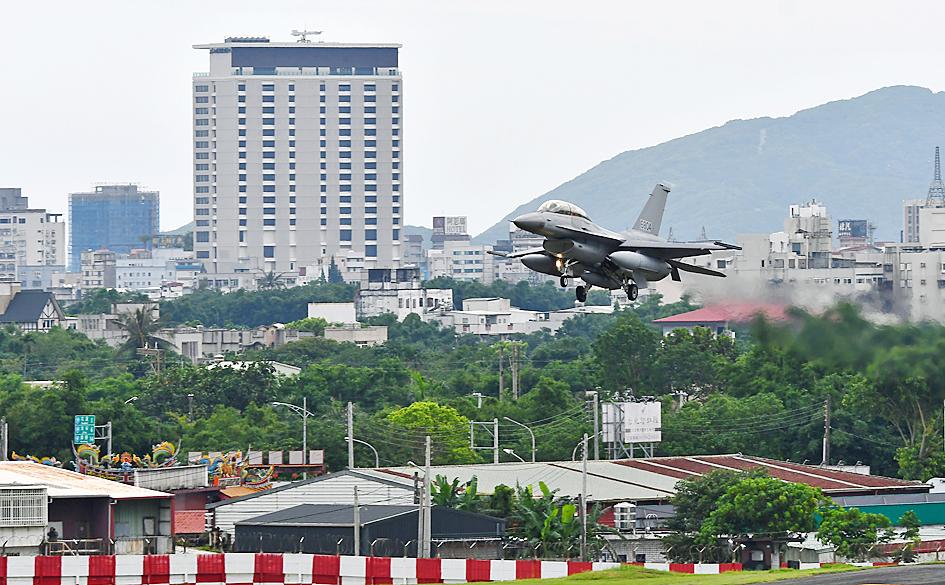Six Taiwanese F-16 jets flew back to Taiwan on Friday from a training mission at Luke Air Force Base in Arizona after a stopover in Honolulu, a military source said.
The F-16s arrived at Hualien Air Force Base in eastern Taiwan at about 3pm, a military official said.
Five of the six jets are single-seat F-16As, while the other is a twin-seat F-16B; four of the aircraft were piloted by Taiwanese air force pilots, the official said.

Photo: Yu Tai-lang, Taipei Times
No further details were given and the air force declined to comment.
The sources said that the six F-16s were among 10 F-16A/Bs that took part in a training mission with Luke Air Force Base’s 21st Fighter Squadron as part of a Taiwan-US training program that began in the 1990s when Taiwan purchased its first batch of the jets from the US.
The jets flew back to Taiwan to be upgraded to the more advanced F-16V format as part of a retrofitting project the air force launched in 2016.
The program involves retrofitting all 140 of Taiwan’s F-16A/Bs to F-16Vs, which are equipped with more advanced avionics, including APG-83 scalable agile beam radar, a helmet-mounted cueing system and other flight management and electronic warfare systems.
The return of the six fighter jets on Friday came just days after another military source told the Central News Agency earlier this week that an F-16 belonging to Taiwan’s air force made a hard landing at an airport in Honolulu due to a landing gear malfunction. No one was injured.
The source confirmed the emergency landing after Hawaiian media reported that the incident ocurred at about 2:45pm on Monday, followed by the temporary closure of a runway at Daniel K. Inouye International Airport.
In Taipei, the Ministry of National Defense declined to comment on the report, but the source at the time said the jet was returning to Taiwan to be upgraded to F-16V configuration.

Alain Robert, known as the "French Spider-Man," praised Alex Honnold as exceptionally well-prepared after the US climber completed a free solo ascent of Taipei 101 yesterday. Robert said Honnold's ascent of the 508m-tall skyscraper in just more than one-and-a-half hours without using safety ropes or equipment was a remarkable achievement. "This is my life," he said in an interview conducted in French, adding that he liked the feeling of being "on the edge of danger." The 63-year-old Frenchman climbed Taipei 101 using ropes in December 2004, taking about four hours to reach the top. On a one-to-10 scale of difficulty, Robert said Taipei 101

Nipah virus infection is to be officially listed as a category 5 notifiable infectious disease in Taiwan in March, while clinical treatment guidelines are being formulated, the Centers for Disease Control (CDC) said yesterday. With Nipah infections being reported in other countries and considering its relatively high fatality rate, the centers on Jan. 16 announced that it would be listed as a notifiable infectious disease to bolster the nation’s systematic early warning system and increase public awareness, the CDC said. Bangladesh reported four fatal cases last year in separate districts, with three linked to raw date palm sap consumption, CDC Epidemic Intelligence

Taiwanese and US defense groups are collaborating to introduce deployable, semi-autonomous manufacturing systems for drones and components in a boost to the nation’s supply chain resilience. Taiwan’s G-Tech Optroelectronics Corp subsidiary GTOC and the US’ Aerkomm Inc on Friday announced an agreement with fellow US-based Firestorm Lab to adopt the latter’s xCell, a technology featuring 3D printers fitted in 6.1m container units. The systems enable aerial platforms and parts to be produced in high volumes from dispersed nodes capable of rapid redeployment, to minimize the risk of enemy strikes and to meet field requirements, they said. Firestorm chief technology officer Ian Muceus said

MORE FALL: An investigation into one of Xi’s key cronies, part of a broader ‘anti-corruption’ drive, indicates that he might have a deep distrust in the military, an expert said China’s latest military purge underscores systemic risks in its shift from collective leadership to sole rule under Chinese President Xi Jinping (習近平), and could disrupt its chain of command and military capabilities, a national security official said yesterday. If decisionmaking within the Chinese Communist Party has become “irrational” under one-man rule, the Taiwan Strait and the regional situation must be approached with extreme caution, given unforeseen risks, they added. The anonymous official made the remarks as China’s Central Military Commission Vice Chairman Zhang Youxia (張又俠) and Joint Staff Department Chief of Staff Liu Zhenli (劉振立) were reportedly being investigated for suspected “serious